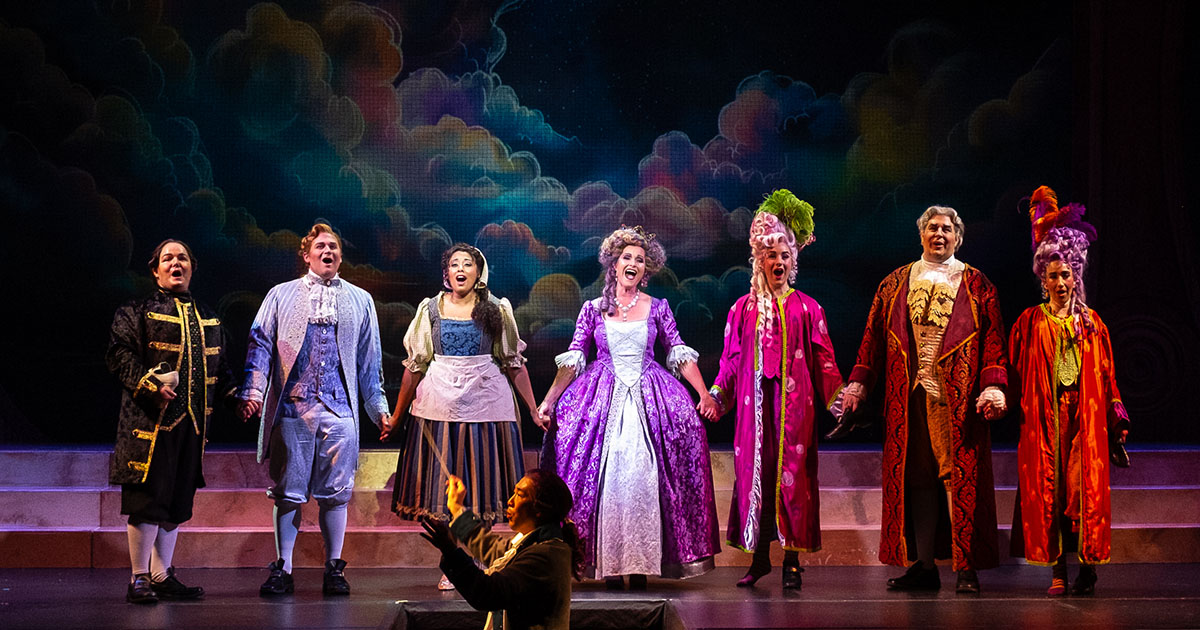Theatrical magic may be hard to define, but don’t tell that to last evening’s audience at Knoxville Opera’s production of Pauline Viardot’s Cendrillon, an adaptation of the Cinderella fairy tale.
First performed in Paris in 1904 in an intimate salon setting with just piano and seven singers, Viardot’s charming operetta has been expanded on brilliantly by Knoxville Opera. Using a 13-piece orchestration by contemporary composer David Hanlon and a re-working of the spoken dialog by stage director Dean Anthony and libretto adaptor Emily Anderson, the production has managed to sparkle with authenticity despite its modern touches. Anthony’s brilliant staging has turned the Bijou’s intimacy and geography into an advantage, placing the instrumentalists in the audience boxes left and right—and in costume—and letting sophisticated projections set the scenes and amuse the audience while simultaneously carrying appropriately translated English super-titles. This eminently cute set and projection design was by Bobby Bradley.
Viardot took some liberties with the original fairy tale by Charles Perrault and Knoxville Opera has continued the process with some light-hearted comic editions and alterations. A prologue has been added that introduces the Fairy Godmother as the narrator, who proceeds to introduce the characters and setting by drawing on her chalkboard, aka— the projection screen. The motherless Cendrillon is at the mercy of, not an evil stepmother, but her bumbling father, Baron de Pictordu and her shallow stepsisters, Armelinde and Maguelonne. Obviously, there must be a Le Prince Charmant who conveniently has a valet Barigoule with which he can swap identities, despite bearing no resemblance. In casting, KO has chosen singers not only with big, flexible voices, but also ones able to project boldly devised comic characters.

Having made a huge impression last season as Susanna in KO’s Le nozze di Figaro, soprano Flora Hawk brought back the poetic charm to the title character of Cendrillon. Once again, she displayed two sides with her voice: the lyrical and sweet contrasted with the surprisingly powerful.
With the elevation and expansion of the character of the Fairy Godmother to narrator, Jacqueline Brecheen was making her KO debut, dare I say, at long last. Brecheen, possessing a voice that is both lyrically beautiful and strong, is a major vocal talent, and, as it turns out, one that also has a delicious and intriguing way with comic delivery.
Impressive, too, was baritone Spencer Reichman as Baron de Pictordu. His rich, dynamic voice made his bumbling, but likable character even more likable.
Tenor Patrick Starke was vocally heroic in best operetta tradition as Le Prince Charmant. Tenor Brian Jeffers had the right mix of comic boldness to go with a fine voice in the role of Barigoule.

The stepsisters, Armelinde (Elizabeth Sarian) and Maguelonne (Sarah-Clementine Mire), turned their physical comedy turns into a feast and made quite an impression in the Prince’s ball “entertainments,” interpolated numbers that will have to remain otherwise un-described.
Having conducted this orchestration of Cendrillon before, conductor Kelly Kuo was ideal for this one. Even though the audience saw only his back from his slot in the stage, his body language magically projected the sense and emotion of the music which he gently, but emphatically led.
There are two more performances of this highly recommended production: Saturday evening at 7:30 PM and Sunday afternoon at 2:30 PM —at the Bijou Theatre in Downtown Knoxville.








